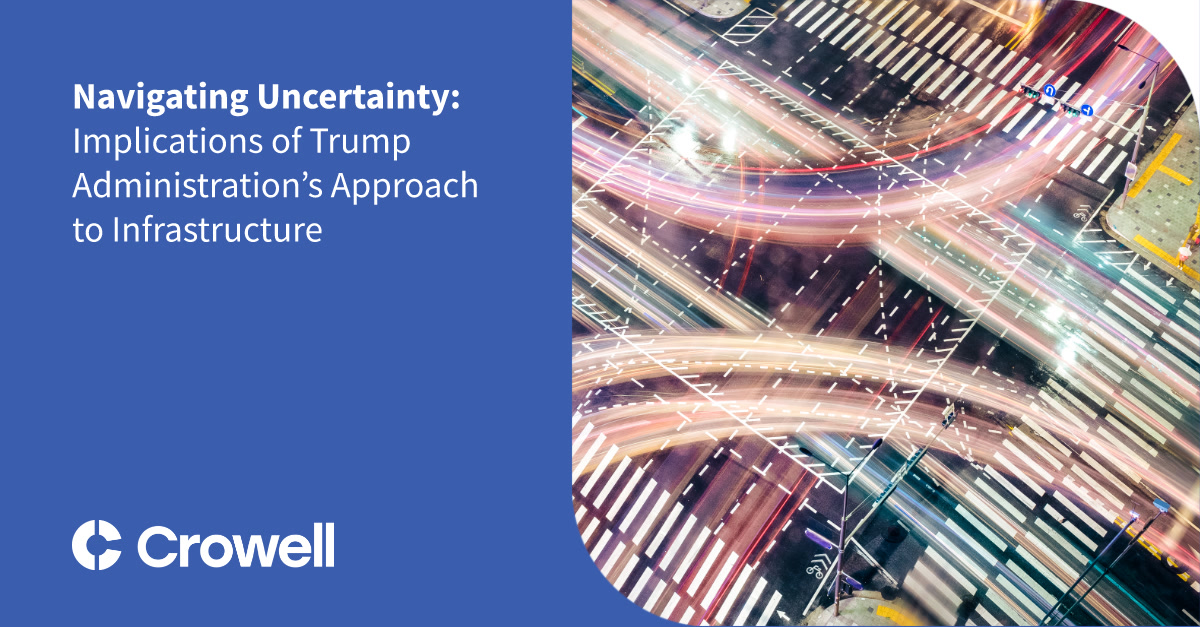The ongoing changes in the U.S. position on infrastructure between the outgoing Biden administration and the incoming Trump administration are creating policy uncertainty for investors and companies in the infrastructure space. This instability may raise concerns among stakeholders that the U.S. is not an ideal location for investment due to political inconsistency and increases the likelihood of disputes related to existing and potential foreign investment projects.
Changes in the implementation of the bipartisan infrastructure law
Potential changes by the Trump administration in allocating funds for transportation, energy, broadband and other projects under the Infrastructure Investment and Jobs Act (IIJA), also known as the bipartisan infrastructure bill, add to the uncertainty for investors.[1]
The Trump administration may take a different approach to implementing the IIJA, which had bipartisan support but was passed during the Biden administration.[2] The IIJA is set to continue under President-elect Trump, who will oversee the final two years of the law. The Trump Administration will have significant influence over the allocation of the remaining $294 billion in IIJA funds, including $87.2 billion in competitive grants.[3] This transition provides the new administration with an opportunity to shape the impact of the law, particularly in areas of focus other than those of the Biden administration.
The Trump administration's criteria for evaluating grant applications remains uncertain, raising questions about possible shifts in priority and the influence of political considerations. At the same time, however, a Brookings analysis found that Republican-leaning states already received more money under the Biden administration than their population warranted, even excluding certain programs such as long-distance passenger rail subsidies.[4] So while the Trump administration may seek to distance itself from Biden-era initiatives, it may face headwinds from members of its own party whose districts benefit from the Biden administration's IIJA investments and who are reluctant to take advantage of the financial benefits and employment opportunities would be forfeited by these investments.[5] Those involved must deal with these uncertainties and adapt to new administrative processes. The possibility of political and administrative changes in the allocation of IIJA funds could impact state and local stakeholders.
Promote public-private partnerships
The second Trump administration could also encourage private investment in public infrastructure projects to leverage federal funding in ways that the Biden administration has not done.[6]
Public-private partnerships (PPPs or P3s) are cooperative agreements between government entities and private sector companies to finance, build and operate projects that serve the public.[7] Examples of PPPs include transportation projects such as highways, bridges, and public transit systems; social infrastructure such as schools, hospitals and social housing; and utility projects such as water treatment plants and energy plants. PPPs are a way to meet infrastructure needs while managing public resources more effectively. However, they require careful planning and clear contractual agreements to ensure that both public and private interests are protected.
In a PPP, both the public and private sectors share the risks and responsibilities associated with the project. These can include financial risks, construction risks and operational risks. The private sector often brings expertise, innovation and efficiency to the project, which can result in cost savings and shorter project timelines. PPPs can provide access to private capital, reduce the need for public funds, and enable the development of infrastructure projects that might otherwise be unaffordable.
However, PPPs often involve long-term commitments.[8] The long-term contracts typical of PPPs ensure that the private sector partner is committed to the project's success throughout the project's life cycle, from construction to operations to maintenance, and even through changes in government administration. The back and forth of differing priorities between administrations can increase uncertainty for private investors seeking to participate in PPPs.
Regulatory instability
Foreign investors in particular rely on policy predictability to make long-term decisions, particularly in industries sensitive to changes in infrastructure policy, such as renewable energy.
Looking ahead, the Trump administration's impending changes in the form of reducing regulatory hurdles to speed approval and completion of infrastructure projects could further disrupt the energy sector. A policy shift could favor fossil fuel projects over clean energy, potentially leading to stranded assets for investors in renewable infrastructure. While many U.S. states (e.g. California) continue to align with climate goals, a lack of state coordination can also result in a patchwork of regulations, increasing compliance costs for foreign investors.
This uncertainty could affect foreign investments made with confidence in changing policies. Instability increases the likelihood of investor-state disputes under bilateral investment treaties (BITs) or free trade agreements such as the United States-Mexico-Canada Agreement (USMCA) when changes are viewed as unfair or discriminatory.[9]
Key insights
The transition from the Biden administration to the new Trump administration is creating significant uncertainty among investors and contractors regarding policies impacting U.S. infrastructure projects. This uncertainty is due to possible changes in the implementation of the IIJA, with the Trump administration having significant influence over the allocation of the remaining funds. Investors are concerned about shifting priorities and political considerations impacting grant valuations. Additionally, the Trump administration could promote PPPs to leverage federal resources, although the long-term nature of these arrangements increases the risks. Regulatory instability, particularly in the energy sector, could also affect investments and lead to higher compliance costs and possible investor-state disputes. Despite these risks and uncertainties, political challenges could limit the extent to which Trump can reverse or modify Biden's initiatives.
Stakeholders in the infrastructure industry can manage and reduce risk by conducting thorough due diligence to identify risks, drafting comprehensive and clear contracts, and ensuring appropriate risk distribution. With changing government policies, it is advisable to consult legal counsel to navigate the changing landscape. Lawyers can advise on, among other things, legal compliance, dispute resolution mechanisms and structuring PPPs to balance interests. Attorneys can also help monitor and enforce contract performance, keep investors and contractors informed of policy and regulatory changes, provide negotiation support, and discuss exit strategies to protect stakeholders' interests. These services help infrastructure stakeholders manage project complexity and ensure contracts are robust, enforceable and aligned with strategic objectives.
